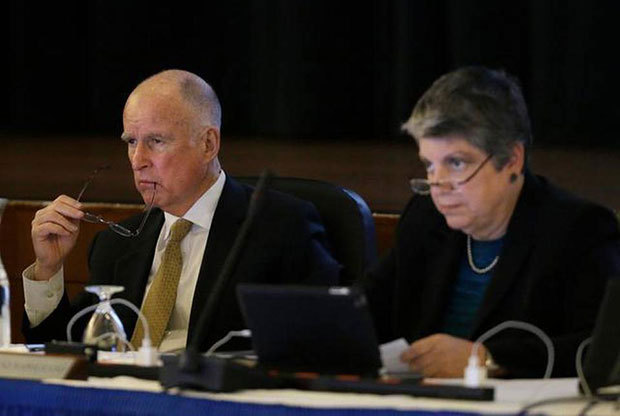Napolitano can send a message with UC pensions

California Gov. Jerry Brown, left, and University of California president Janet Napolitano listen to speakers during a UC Board of Regents meeting in San Francisco in January. The two are at odds over the direction and budget of the university. Jeff Chiu The Associated Press
A cap would save and reach out
By the Editorial Board
When Gov. Jerry Brown took office in 2011, one of his first acts was to make state employees give back their sweet government cellphones and state cars.
The savings was a drop in the bucket, given the state’s massive budget, but Brown was sending a message: This is the people’s work, not the private sector. That can be easy to forget in a culture where the median CEO pay now tops $10 million. Sometimes white-collar public servants need a reminder.
Brown thinks the University of California needs some reminding now.
As the governor’s battle of wills with UC President Janet Napolitano has deepened, his legislative allies are demanding that, rather than hike tuition, she cut costs.
Napolitano has already saved hundreds of millions in back-office changes, but lawmakers want more. An Assembly subcommittee on education finance has been pointedly asking about payroll. Administrative bloat has come up, as have university pensions.
Assemblyman Roger Hernández, D-West Covina (and UC Riverside Class of ’02), wants to cap UC employee salaries. He thinks no one at the university should make more than $500,000.
We tend to agree, but, like the phone-and-car clawbacks, that and more than a few other ideas are just symbolic.
Only 387 of the university’s 198,000 or so employees make more than $500,000 a year, for instance, and most are high-profile coaches or UC medical center doctors whose pay mostly comes from sources other than state money. Napolitano’s own $570,000 salary comes from a multiplicity of pots.
Just three UC employees in the $500,000-plus club were paid that amount from the “core” budget that includes taxpayer funding. So while it’s debatable whether the UC Berkeley chancellor and the deans of the medical and business schools at UCLA are worth such big bucks, three paychecks out of a multimillion-dollar budget aren’t going to amount to that much.
One legislative idea, however, would make a difference: Rethinking UC’s pension cap.
As Napolitano has herself complained, the university’s employer contribution to its pension fund is a constant burden, and the state doesn’t cover the obligation as it does for community colleges and the California State University.
But UC hasn’t done all it can do to limit its pension obligations. Unlike the state, which waged a battle royal a few years ago to cap pensionable income for its employees, the university has continued to tie its retirement payouts to a higher benchmark.
So this year, for instance, state employees can only count $118,500 in base pay in figuring their pensions, but UC employees can count as much as $265,000 in compensation.
That’s a sweet retirement deal for, say, the 6,000 or so UC employees – again, mostly doctors – whose annual salaries top $200,000. But do people in that income bracket really require such big pensions? And can UC really afford to hand them out?
Assemblyman Kevin McCarty, D-Sacramento, chairman of the budget subcommittee examining the UC budget, told The Sacramento Bee editorial board members that just matching the state pension cap could eventually save the university an estimated $80 million to $100 million annually over the long term. That’s enough to cover in-state enrollment for 10,000 California kids.
In the short term, it wouldn’t mean much. Only new employees could be affected. But embracing the idea would send a message.
Napolitano needs the Legislature and Brown; this isn’t the private sector. It wouldn’t hurt to show that she’ll work with them.
[Source]: Sacramento Bee


